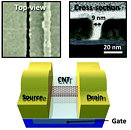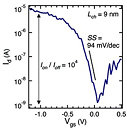- Joined
- Oct 9, 2007
- Messages
- 47,539 (7.46/day)
- Location
- Hyderabad, India
| System Name | RBMK-1000 |
|---|---|
| Processor | AMD Ryzen 7 5700G |
| Motherboard | ASUS ROG Strix B450-E Gaming |
| Cooling | DeepCool Gammax L240 V2 |
| Memory | 2x 8GB G.Skill Sniper X |
| Video Card(s) | Palit GeForce RTX 2080 SUPER GameRock |
| Storage | Western Digital Black NVMe 512GB |
| Display(s) | BenQ 1440p 60 Hz 27-inch |
| Case | Corsair Carbide 100R |
| Audio Device(s) | ASUS SupremeFX S1220A |
| Power Supply | Cooler Master MWE Gold 650W |
| Mouse | ASUS ROG Strix Impact |
| Keyboard | Gamdias Hermes E2 |
| Software | Windows 11 Pro |
Researchers at IBM have developed the smallest carbon nanotubule transistor, that is 9 nanometers (nm) across. In comparison, the smallest transistors possible using silicon is 10 nm across. IBM claims its new transistor consumes less power while being able to carry more current than today's technology.
"The results really highlight the value of nanotubes in the most sophisticated type of transistors," says John Rogers, professor of materials science at the University of Illinois at Urbana-Champaign. "They suggest, very clearly, that nanotubes have the potential for doing something truly competitive with, or complementary to, silicon." Currently, the smallest production-grade transistors are 22 nm across.


The success of 9 nm carbon nanotubule transistors potentially extends the life of conventional electronics as we know it, as it breaches the 10 nm limit of silicon transistors. "If nanotubes can't go much further than silicon, then working on them is a waste of time," says Aaron Franklin, a researcher at the IBM Watson Research Center in Yorktown Heights, New York. "We've made nanotube transistors at aggressively scaled dimensions, and shown they are tremendously better than the best silicon devices." The research team, however, is faced with development hurdles. Manufacturing large batches of carbon nanotubules that function as semiconductors is difficult.
View at TechPowerUp Main Site
"The results really highlight the value of nanotubes in the most sophisticated type of transistors," says John Rogers, professor of materials science at the University of Illinois at Urbana-Champaign. "They suggest, very clearly, that nanotubes have the potential for doing something truly competitive with, or complementary to, silicon." Currently, the smallest production-grade transistors are 22 nm across.


The success of 9 nm carbon nanotubule transistors potentially extends the life of conventional electronics as we know it, as it breaches the 10 nm limit of silicon transistors. "If nanotubes can't go much further than silicon, then working on them is a waste of time," says Aaron Franklin, a researcher at the IBM Watson Research Center in Yorktown Heights, New York. "We've made nanotube transistors at aggressively scaled dimensions, and shown they are tremendously better than the best silicon devices." The research team, however, is faced with development hurdles. Manufacturing large batches of carbon nanotubules that function as semiconductors is difficult.
View at TechPowerUp Main Site





